|
|
|
Sort Order |
|
|
|
Items / Page
|
|
|
|
|
|
|
| Srl | Item |
| 1 |
ID:
118301
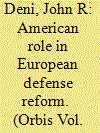

|
|
|
|
|
| Publication |
2012.
|
| Summary/Abstract |
In order to influence the direction and outcomes of defense reforms occurring across Europe, the United States needs to refocus its military-to-military engagement programs with its European allies. Instead of seeking to build partner capacity among the newest NATO members or aspirants, Washington will be better served by maintaining and strengthening interoperability with those allies that are adaptive and innovative, deployable and expeditionary, and capable of full spectrum operations-that is, allies such as France, Italy, Germany, the Netherlands and the United Kingdom. This finding is based upon what Washington itself sees as the future of conflict and the kinds of coalition partner skills and abilities the United States will need to counter post-International Security Assistance Force International Security Assistance Force (ISAF) threats to U.S. and collective security. Given budget and force structure cuts facing the United States as well, the American military cannot afford to waste its limited security cooperation resources.
|
|
|
|
|
|
|
|
|
|
|
|
|
|
|
|
| 2 |
ID:
118300


|
|
|
|
|
| Publication |
2012.
|
| Summary/Abstract |
The European Union is in crisis because it is based on a wrong understanding of political development. Its founding assumption is that a common market and a common currency would lead to a unified polity; that Europeans would arise out of the euro. This has not happened and Europe is fraying economically and politically. And the United States is not a disinterested spectator because a weaker and more divided Europe undermines a key foreign policy objective pursued over the last century-of a Europe whole, secure, and free. Consequently, it is premature for Washington to reorient its strategic attention away from Europe.
|
|
|
|
|
|
|
|
|
|
|
|
|
|
|
|
| 3 |
ID:
118303
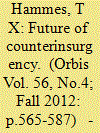

|
|
|
|
|
| Publication |
2012.
|
| Summary/Abstract |
This article addresses why counterinsurgency is not, in fact, a strategy, and why the United States will nevertheless need to retain a counterinsurgency capability. It further examines the drivers of modern insurgency; the range of counterinsurgency approaches that have worked globally; and several case studies that illustrate how the United States might improve its counterinsurgency activity moving forward.
|
|
|
|
|
|
|
|
|
|
|
|
|
|
|
|
| 4 |
ID:
118308
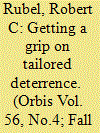

|
|
|
|
|
| Publication |
2012.
|
| Summary/Abstract |
The assumption that the United States operates from a position of strength relative to its potential enemy underpins U.S. deterrence theory. This perceived strength has emboldened American administrations to take serious tactical risks, such as the positioning of aircraft carriers in the Eastern Mediterranean during the 1973 Yom Kippur War in order to dissuade Soviet intervention in that conflict. This tacit assumption, facilitated and entrenched by overwhelming U.S.conventional military superiority in the post-Cold War era, forms the foundation both for the relatively recent developmentof tailored deterrence and for the "Flexible Deterrence Options" (FDO) that now constitute a routine aspectof the joint military planning process. This article argues that the tacit assumption of strength is too narrow and can promote the implementation of deterrent policies and actions that have the opposite effects of those intended. Deterrence, rightly understood, is a component of a conflict management strategy which implies a degree of weakness on the part of the statethat employs it. This condition must be recognized and then incorporated into policies and plans for deterrence.
|
|
|
|
|
|
|
|
|
|
|
|
|
|
|
|
| 5 |
ID:
118306
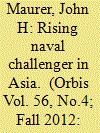

|
|
|
|
|
| Publication |
2012.
|
| Summary/Abstract |
The end of Great Britain's standing as a superpower conjures up a frightening picture of how a post-American world might come about, not by a gradual, managed decline of the United States, but rather by a sudden defeat at sea. Some 70 years ago, Britain's navy suffered staggering losses at the hands of an emerging peer competitor in Asia. Could a reversal of fortune of this magnitude-the world's leading naval power being soundly beaten by a rising challenger-happen again? Britain's naval downfall in Asia provides a sobering parable, warning of potential dangers looming for the United States in the twenty-first century.
|
|
|
|
|
|
|
|
|
|
|
|
|
|
|
|
| 6 |
ID:
118302


|
|
|
|
|
| Publication |
2012.
|
| Summary/Abstract |
Despite the initially cordial relationship between the United States and Russia following the September 11, 2001 attacks, the Iraq War became a turning point in what evolved into the worst relationship between Moscow and Washington since the Cold War. From that point onwards, Russia persistently has exhibited aggressive behavior toward the United States, resulting in numerous crises. This article argues that this Russian assertiveness is deliberate, arising from a mixture of domestic and international factors. In light of recent developments in U.S.-Russian relations, especially the decision of American President Barack Obama to abandon the Bush Administration's scheme to deploy national missile defense (NMD) system in Eastern Europe, it is important to understand that Russia's grand strategy is aimed at promoting multipolarity and that Moscow is willing to apply limited military force to achieve its goals. The Obama Administration should engage Russia, but be prepared to confront it if necessary.
|
|
|
|
|
|
|
|
|
|
|
|
|
|
|
|
| 7 |
ID:
118304
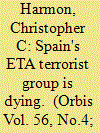

|
|
|
|
|
| Publication |
2012.
|
| Summary/Abstract |
The armed organization "Basque Fatherland & Liberty" undertook a struggle for an independent homeland vis-à-vis Spanish central government over half a century ago. But today, the author argues, the ETA appears doomed for three reasons. First, Spanish statesmen of the late 1970s agreed to limited autonomy for Basque-dominated provinces, and over time this undermined militancy. Second, Paris has become a strong partner to Madrid in pursuing ETA members-who once could hide readily amidst French Basques. And finally, Spanish policing is now excellent. With good intelligence and professionalism, varied internal security forces have been confronting ETA gunmen and tracking down the personnel of proscribed support groups. Thus, a resilient Spanish democracy offers a case study in how terrorist groups may end.
|
|
|
|
|
|
|
|
|
|
|
|
|
|
|
|
| 8 |
ID:
118305
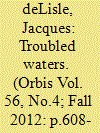

|
|
|
|
|
| Publication |
2012.
|
| Summary/Abstract |
Among China's unresolved frontier questions, the South China Sea has become the most complex and troubled, and arguably the most significant and disconcerting. The economic and security stakes are high and the stake-holding states numerous and diverse. The claims that China (and others) make about the region reflect such interests but they are, ultimately, legal claims. Beijing's assertions of rights to the disputed areas have rested on three conceptually distinct grounds. Each presents a different mix of challenge and accommodation to international legal norms and the interests of other states, including China's neighbors, near-neighbors and the United States.
while China's behavior (as well as that of other interested states) has been more and less assertive at various times, China's three basic arguments claiming rights to the region have been comparatively stable. Both China's pattern of multiple legal arguments and fluctuating actions and rhetoric do little to resolve the debate over whether a rising China will be deeply disruptive of the regional and international order or whether it can-with sufficient skill and tolerable adjustments-be accommodated and integrated. Although China's stance on rights in the South China Sea may be partly the accidental product of conflicting agendas and shifting assessments, Beijing's embrace of three distinct lines of legal argument arguably constitutes a strategy that serves China's interests given the factual, legal and strategic environment that China faces.
|
|
|
|
|
|
|
|
|
|
|
|
|
|
|
|
| 9 |
ID:
118307
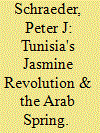

|
|
|
|
|
| Publication |
2012.
|
| Summary/Abstract |
Tunisia's Jasmine revolution and the Arab Spring are unfolding amidst the resurgence of five sets of debates over the proper role of the international community in democracy promotion efforts abroad, including in the Middle East and North Africa, which were once thought to be impervious to democratic change. These debates, which are explored here within the context of the Arab Spring, range from the normative question of whether the international community should be actively involved in democracy promotion efforts abroad, to what forms of intervention should constitute part of the global arsenal for those intent on seeking democracy's spread. A final section reflects on whether international efforts will contribute to the further strengthening of the Arab Spring or a return to an Arab Winter of authoritarianism.
|
|
|
|
|
|
|
|
|
|
|
|
|
|
|
|
|
|
|
|
|